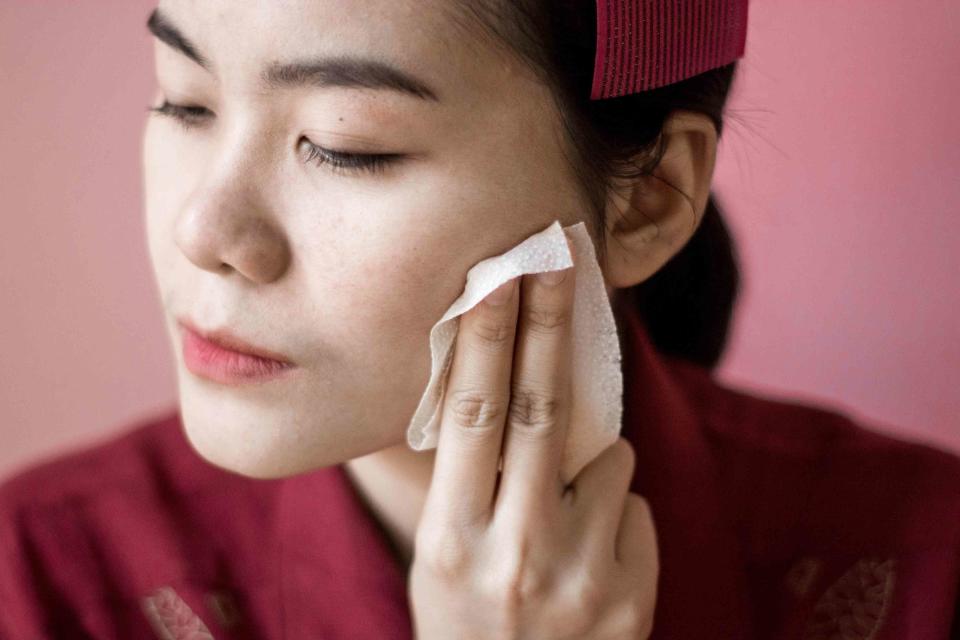How Often Should You Wash Your Face If You Have Acne?
Here’s the frequency that dermatologists recommend.

Kittisak Phawingrum/Getty Images
Figuring out how often to wash your face is perhaps one of the most confusing topics for people struggling with acne. While you might have an inclination to wash more frequently—and good hygiene is paramount to a clear complexion—overwashing can exacerbate the issue and lead to others. So how often should you wash your face when dealing with acne? We asked a handful of dermatologists to weigh in on the topic so we can get a definitive answer.
RELATED: 8 Things That Might Be Causing Your Adult Acne
The Problem With Over-Washing Your Skin
There is a misconception that oil equals acne, or that breakouts imply your skin is somehow “dirty” and must be washed right away. The reality is that many things can trigger acne and extra facial cleansing shouldn’t be your default solution.
“Since washing the face removes makeup, dirt, and bacteria, people with acne tend to think that washing more frequently will help eliminate or reduce acne,” says Carl Thornfeldt, MD, clinical dermatologist. “However, too frequent washing or aggressive washing can actually irritate and harm the skin barrier, leading to more acne.”
He adds that many cleansers—particularly those with acne-clearing ingredients such as salicylic acid or benzoyl peroxide—aggressively zap oil. When used too much, you may inadvertently remove the oils that are actually necessary to keep your skin healthy.
“If the removal of the oils that keep your skin barrier intact are constantly being washed away, your skin will overproduce sebum, which clogs your pores, drives inflammation [and] redness in the skin, and may result in more breakouts,” warns Dr. Thornfeldt.
How Often to Wash Your Face If You Have Acne
Each dermatologist we spoke to agreed that washing your face twice per day is typically plenty—once in the morning, and once in the evening. The AM wash removes excess oil produced overnight while your evening wash sweeps away makeup, dirt, and bacteria that accumulated throughout the day.
The only exception is that you should wash your face after exercising, playing sports, or otherwise sweating a lot, says Rebecca Marcus, MD, board-certified dermatologist. “You don’t want to allow sweat and sebum to sit on the skin after working out, so this situation sometimes necessitates an additional cleanse during the day."
Signs of overwashing or an overly-aggressive skincare regimen include flakiness, excessive dryness, increased oil production, redness, tightness, and skin sensitivity. One of the biggest tells is flaky, dry, and tight skin that still feels oily.
How to Pick a Cleanser for Acne-Prone Skin
The best thing you can do to calm breakouts is to prioritize skin barrier health and be gentle with your skin.
“It's important to use a gentle cleanser that is designed for acne-prone skin and avoid scrubbing or using harsh exfoliants, which can irritate the skin and exacerbate acne,” advises Dusan Sajic, MD, an international board-certified medical and cosmetic dermatologist.
Dr. Sajic says to use cleansers formulated with gentle, barrier-bolstering ingredients. Bonus points if they are labeled and designed specifically for people with sensitive and acne-prone skin. To jump start your search, we recommend CeraVe Acne Control Face Cleanser ($14, target.com), Cetaphil Gentle Clear Clarifying Acne Cream Cleanser ($10; amazon.com), La Roche Posay Effaclar Acne Face Cleanser ($15.99, target.com), and Avene Cleanance Cleansing Gel ($20, ulta.com).
The above facial cleansers are excellent for targeting active breakouts and minimizing future breakouts. If your skin clears up and breakouts become a thing of the past, switch to a non-medicated, gentle cleanser and continue washing morning and evening per usual.
Along with washing with a gentle cleanser twice daily, Dr. Sajic has a few additional tips and tricks to help minimize and calm breakouts.
Avoid touching your face throughout the day
Use a clean town to dry your face
Moisturize every time you wash with an oil-free product
Change your pillowcase weekly
Maintain a healthy diet and exercise regularly
Manage stress
Consider professional in-office treatments that target acne, such as lasering or chemical peels
Speak with a dermatologist about persistent or extreme cases of acne so you can target the cause and create a game plan for a clear complexion
For more Real Simple news, make sure to sign up for our newsletter!
Read the original article on Real Simple.

